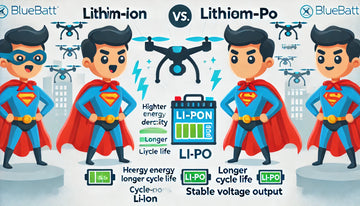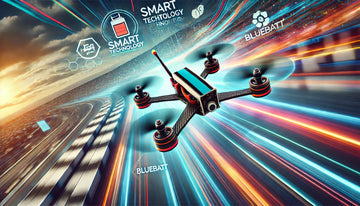Introduction: In the world of drones, battery technology plays a crucial role in determining flight performance and endurance. Two of the most common battery types used in drones are Lithium-Ion (Li-Ion) and Lithium-Polymer (Li-Po) batteries. While both have their advantages, Li-Ion batteries are increasingly preferred for their ability to enhance endurance. In this blog post, we will explore how Li-Ion batteries can significantly increase the flight time and reliability of your drones compared to Li-Po batteries.
Understanding Li-Ion and Li-Po Batteries: Before diving into the advantages of Li-Ion batteries, it's essential to understand the basic differences between Li-Ion and Li-Po batteries.
-
Lithium-Ion (Li-Ion) Batteries: Li-Ion batteries have a higher energy density, meaning they can store more energy in the same amount of space compared to Li-Po batteries. They typically come in cylindrical or rectangular shapes and are known for their long cycle life and stable voltage output.
-
Lithium-Polymer (Li-Po) Batteries: Li-Po batteries use a polymer electrolyte, which makes them lighter and more flexible in terms of shape. They are commonly used in applications where weight and shape are critical factors. However, they generally have a lower energy density than Li-Ion batteries.
Advantages of Li-Ion Batteries for Drone Endurance:
-
Higher Energy Density: The most significant advantage of Li-Ion batteries is their higher energy density. This means they can store more energy per unit of weight, allowing drones to fly longer on a single charge. For drone enthusiasts and professionals who require extended flight times, this is a game-changer.
-
Longer Cycle Life: Li-Ion batteries have a longer cycle life compared to Li-Po batteries. This means they can be charged and discharged more times before their capacity significantly degrades. This longevity translates to lower replacement costs and more consistent performance over time.
-
Stable Voltage Output: Li-Ion batteries provide a more stable voltage output throughout their discharge cycle. This stability ensures that the drone's performance remains consistent, avoiding sudden drops in power that can occur with Li-Po batteries.
-
Better Safety Features: Advances in Li-Ion battery technology have led to the development of safer battery designs. Many Li-Ion batteries now come with built-in protection circuits that prevent overcharging, over-discharging, and short-circuiting, enhancing the overall safety of the drone.
Practical Tips for Using Li-Ion Batteries:
-
Proper Charging Practices: Use a high-quality charger specifically designed for Li-Ion batteries. Avoid overcharging or discharging the battery beyond its recommended limits to maximize its lifespan.
-
Storage: Store Li-Ion batteries at a partial charge (around 50%) in a cool, dry place when not in use. This helps in maintaining their capacity and preventing degradation.
-
Monitoring: Regularly monitor the battery's health and performance. Many smart chargers and battery management systems can provide detailed insights into the battery's condition, helping you maintain optimal performance.
Conclusion: Switching to Li-Ion batteries can significantly enhance the endurance and reliability of your drones. With higher energy density, longer cycle life, stable voltage output, and improved safety features, Li-Ion batteries are the superior choice for those looking to get the most out of their drone flights. At BlueBatt Batteries, we offer a range of high-quality Li-Ion batteries designed to meet the rigorous demands of modern drones. Explore our products and experience the difference in performance and endurance today.



